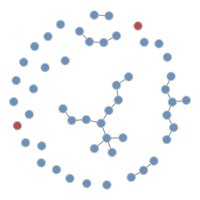
Bio
I am an infectious disease epidemiologist specializing in mathematical and computational approaches for investigating epidemic dynamics. I lead the EpiModel Research Lab at Emory and collaborate on many research studies that develop infectious disease modeling methods and applications.
My methodological research focuses on the development of an open-source software platform for epidemic modeling, EpiModel, which allows users to build, simulate, and analyze complex mechanistic models for transmission of arbitrarily defined infectious disease systems. EpiModel provides a powerful toolkit for modeling dynamic contact networks that are often fundamental for representing transmission of diseases requiring direct contact. EpiModel has been used in over 70 scientific publications, both by my lab and modeling researchers around the world!
 My applied research focuses on the epidemiology of sexually transmitted infections (e.g., HIV, gonorrhea) and respiratory infections (e.g., TB and SARS-CoV-2). I am interested in the drivers of these diseases and optimal designs for prevention and control strategies. Recent applications have used models to simulate the co-circulation of multiple pathogens within the same hosts, since the risk factors for acquiring one disease may depend on the epidemic dynamics of other infections transmitted along the same contact network.
My applied research focuses on the epidemiology of sexually transmitted infections (e.g., HIV, gonorrhea) and respiratory infections (e.g., TB and SARS-CoV-2). I am interested in the drivers of these diseases and optimal designs for prevention and control strategies. Recent applications have used models to simulate the co-circulation of multiple pathogens within the same hosts, since the risk factors for acquiring one disease may depend on the epidemic dynamics of other infections transmitted along the same contact network.
My EpiModel Research Lab actively supports and mentors MPH and PhD students, post-docs, and research staff who work with me in these areas. My current publication list may be found on Google Scholar or PubMed.
I am faculty director of the Infectious Disease Epidemiology Certificate program at RSPH. This certificate organizes our infectious disease classroom education and extramural training activities for the MPH/MSPH degrees. The certificate is open any MPH/MSPH students across departments at RSPH.
I teach two courses at RSPH: EPI 570 (Infectious Disease Dynamics: Theory and Models), which is a 3-credit course offered in the Spring semester that focuses on the mathematical modeling of infectious diseases; and EPI 512 (Current Topics in Infectious Disease Epidemiology), which is a 1-credit course offered in the Fall semester that is an orientation course for our ID certificate program that provides a broad introduction to infectious disease epidemiology methods and disease areas.
Areas of Interest
- HIV/AIDS Prevention
- Infectious Disease
- Epidemiology
- Health Disparities
- Infectious Disease Dynamics
- Disease Ecology
- Network Science
Education
- School of Public Health, University of Washington
- PhD, University of Washington
- MPH, Boston University
- BA, Boston University
Courses Taught
- EPI 570 - Infectious Disease Dynamics
- EPI 512 - Current Topics in ID EPI
- EPI 798R - Pre-candidacy Research
- EPI 799R - Research
